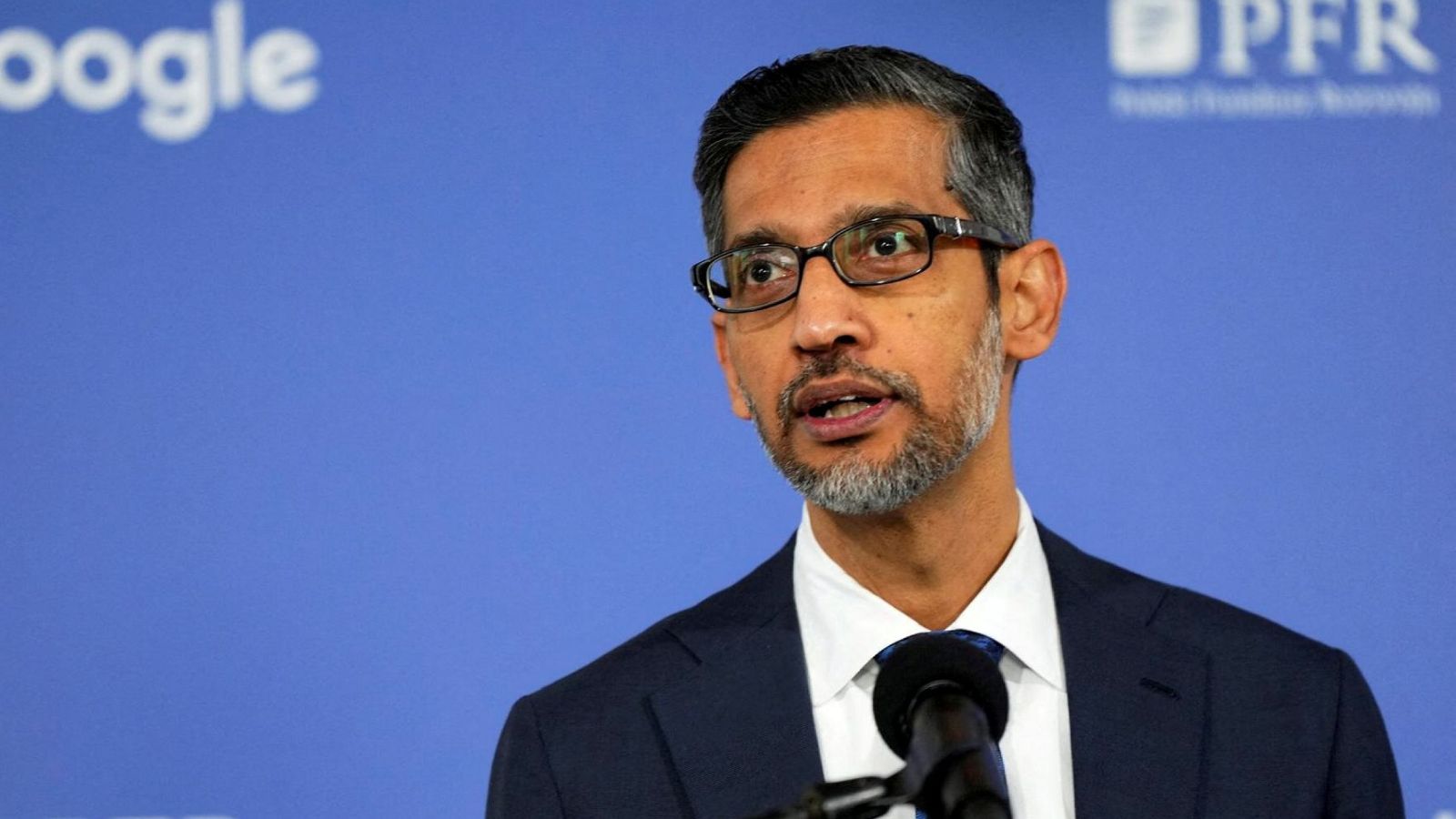Google targets 1000x compute growth, aims to double capacity every 6 months: Report
Google’s future compute targets come at a time when Silicon Valley and Wall Street are debating whether the AI boom is inflating into a bubble and what a market crash would mean for various stakeholders.
 Alphabet and Google CEO Sundar Pichai speaks to media following his meeting with Polish Prime Minister Donald Tusk (not pictured) at Google Campus in Warsaw, Poland, February 13, 2025. REUTERS/Aleksandra Szmigiel/File Photo
Alphabet and Google CEO Sundar Pichai speaks to media following his meeting with Polish Prime Minister Donald Tusk (not pictured) at Google Campus in Warsaw, Poland, February 13, 2025. REUTERS/Aleksandra Szmigiel/File PhotoGoogle is reshuffling its compute priorities in order to meet the growing demand for its artificial intelligence (AI) products and services.
The search giant envisions reaching 1000x serving capacity in the next four to five years by doubling it every six months, according to a report by CNBC. Google needs to be “able to deliver 1,000 times more capability, compute, storage networking for essentially the same cost and increasingly, the same power, the same energy level,” Amin Vahdat, a vice president at Google Cloud, was quoted as saying at an all-hands meeting earlier this month.
“The competition in AI infrastructure is the most critical and also the most expensive part of the AI race […] It won’t be easy but through collaboration and co-design, we’re going to get there,” Vahdat added. Alphabet CEO Sundar Pichai and CFO Anat Ashkenazi were also reportedly present at the meeting.
Rather than outspending the competition, Google plans on building AI infrastructure that is far “more reliable, more performant and more scalable than what’s available anywhere else,” as per the report.
Google’s future compute and cloud targets come at a time when Silicon Valley and Wall Street are debating whether the AI boom is inflating into a bubble and what a market crash, similar to the dot-com crash of the 2000s, would mean for various stakeholders.
Fear and speculation of the AI market bubble have been driven partially due to surging capital expenditures by hyperscalers such as Microsoft, Amazon, and Meta on AI infrastructure and compute. In its third-quarter results, Alphabet reported that it has raised its capital expenditures forecast for the second time this year, to a range of $91 billion to $93 billion, followed by a “significant increase” in 2026. Collectively, the four big tech companies reportedly aim to spend more than $380 billion this year.
However, the anticipated spend of trillions of dollars over the next few years could be essential for Google, OpenAI and other companies looking to win the AI race by getting their products into the hands of as many people as possible.
At the meeting, Pichai reportedly gave the example of Google’s video generation tool, Veo, to point out that capacity supply is the bottleneck. “When Veo launched, how exciting it was. If we could’ve given it to more people in the Gemini app, I think we would have gotten more users but we just couldn’t because we are at a compute constraint,” he said.
In response to an employee question about the AI bubble, the CEO reiterated the risk of not investing aggressively enough. “I think it’s always difficult during these moments because the risk of underinvesting is pretty high. I actually think for how extraordinary the cloud numbers were, those numbers would have been much better if we had more compute,” he said.
Pichai, in a recent interview with the BBC, warned of the impact if an AI bubble were to burst. “I think no company is going to be immune, including us,” he said.
Beyond infrastructure build-outs, Google is also planning on boosting capacity with more efficient models and through its custom silicon. Last week, Google launched its seventh generation Tensor Processing Unit (TPU) called Ironwood, which the company claims is nearly 30 times more power efficient than its first Cloud TPU from 2018. Its newest AI model, Gemini 3, is supposedly designed to provide better answers to more complex questions compared with prior models.







